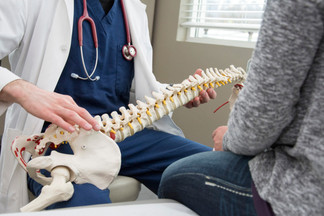Posted by Dee Cee Labs on Jan 28th 2026
Enhancing Musculoskeletal Health with Vitamin D and K Supplements
As a chiropractor, you're well-aware of the importance of spinal adjustments. But did you know that almost half of all chiropractic doctors are also incorporating nutritional services? Specifically, if you're delving into the realm of supplements, vitamins D and K should be on your radar. Alone, they offer significant benefits. But combined, they can bring unparalleled synergy to musculoskeletal health.
Spotlight on Vitamins D & K
- Vitamin D: Primarily recognized for its crucial role in bone health by facilitating calcium absorption. Furthermore, the Office of Dietary Supplements (ODS) highlights its functions in inflammation control, cellular growth regulation, immune system fortification, and glucose metabolism.
- Vitamin K: This vitamin is pivotal for bone metabolism. ODS sheds light on its function as a coenzyme necessary for producing bone metabolism proteins. Additionally, it’s the body's go-to for blood clotting post-injury.
Adequate levels of these vitamins are non-negotiable. Insufficient vitamin D can lead to ailments like rickets in children and osteomalacia in adults. On the other hand, vitamin K deficiency increases risks of excessive bleeding, hemorrhage, and even osteoporosis.
However, the magic truly happens when these two vitamins unite.
The Power Duo: Vitamin D & K
Think about weight loss. You can either cut back on calories or up your exercise. But combine both? That’s where the real results are. Similarly, when vitamins D and K collaborate, bone health benefits are magnified.
- A study with knee osteoarthritis patients highlighted a direct relationship between adequate vitamin D and K intake and improved lower-extremity function.
- An article from the International Journal of Endocrinology in 2017 discussed how vitamin D augments the production of vitamin K-dependent proteins, further supporting bone health. Postmenopausal women, in particular, seem to benefit tremendously from this synergy.
Let’s further delve into vitamin K:
- Vitamin K1 (phylloquinone) is abundant in leafy greens.
- Vitamin K2 (menaquinones) is not just produced in our gut but is also present in meat, eggs, dairy, and natto (fermented soybeans). Notably, meta-analyses in 2020 and 2021 pinpointed the superior effects of a vitamin D and K2 combo in promoting bone density.
Moreover, this dynamic duo also plays a part in heart health. A 2020 study linked low levels of both vitamins to elevated risks of mortality and cardiovascular issues.
Selecting a Reliable D-K Supplement
The Food and Drug Administration (FDA) offers guidelines for supplement selection:
- Gauge the individual's nutritional requirements against their overall diet.
- Ensure the supplement's safety considering the person's overall health and nutrition.
- Stay alert for potential interactions with any of the patient's current medications.
Patients should also understand that supplement manufacturers are largely responsible for the safety and effectiveness of their products. Therefore, choosing a trusted manufacturer is paramount. Look for those that prioritize quality assurance, control, and manufacture in FDA-regulated facilities.
Incorporating the right supplements can be a game-changer in musculoskeletal health. With this knowledge, you can now guide your patients to the right choices.
Shop Now: Dee Cee Labs Vitamins D3 + K2

